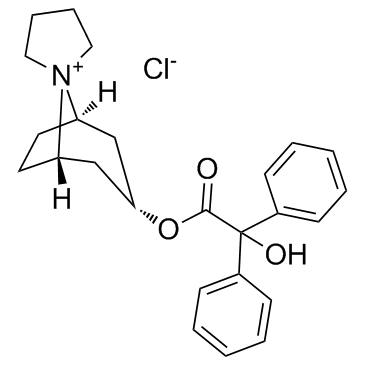Brain penetration of the OAB drug trospium chloride is not increased in aged mice.
Jasmin Kranz, Ernst Petzinger, Joachim Geyer
文献索引:World J. Urol. 31(1) , 219-24, (2013)
全文:HTML全文
摘要
To analyse whether the permeability of the blood-brain barrier to the antimuscarinic drug trospium chloride is altered with ageing. This is a relevant question for elderly patients with overactive bladder syndrome who are treated with trospium chloride as the occurrence of adverse effects on the central nervous system (CNS) highly depends on the absolute drug concentration in the brain.Trospium chloride at 1 mg/kg was intravenously administered to adult, middle-aged, and aged mice at 6, 12, and 24 months of age, respectively, and the absolute drug concentrations in the brain were analysed after 2 h. Furthermore, mRNA expression levels of relevant markers of blood-brain barrier integrity (occludin, claudin-5, and the drug efflux carrier P-glycoprotein) were analysed in brain samples from adult and aged mice.The absolute brain concentrations of the drug were identical in adult and middle-aged mice (13 ± 2 ng/g vs. 13 ± 2 ng/g) and were slightly, but significantly, lower in aged mice (8 ± 4 ng/g). The brain/plasma drug concentration ratios were not different between the age groups and demonstrated the generally low capability of trospium chloride in permeating the blood-brain barrier. Occludin, claudin-5, and P-glycoprotein showed identical mRNA expression levels in the brains of adult and aged mice.Based on our in vivo data in a mouse model, we conclude that trospium chloride permeation across the BBB is not increased in ageing per se, and therefore, the occurrence of adverse CNS drug effects is also not expected to increase with ageing.
相关化合物
| 结构式 | 名称/CAS号 | 分子式 | 全部文献 |
|---|---|---|---|
 |
曲司氯胺
CAS:10405-02-4 |
C25H30ClNO3 |
|
New strategies for medical management of overactive bladder ...
2010-07-01 [Curr. Opin. Urol. 20(4) , 313-7, (2010)] |
|
What is the success of drug treatment in urge urinary incont...
2013-03-01 [Arch. Gynecol. Obstet. 287(3) , 511-8, (2013)] |
|
Benefits and harms of pharmacologic treatment for urinary in...
2012-06-19 [Ann. Intern. Med. 156(12) , 861-74, W301-10, (2012)] |
|
Mechanistic investigation of food effect on disintegration a...
2012-10-01 [Biopharm. Drug Dispos. 33(7) , 403-16, (2012)] |
|
Trospium chloride--an effective drug in the treatment of ove...
2012-05-01 [World J. Urol. 19(5) , 336-43, (2001)] |